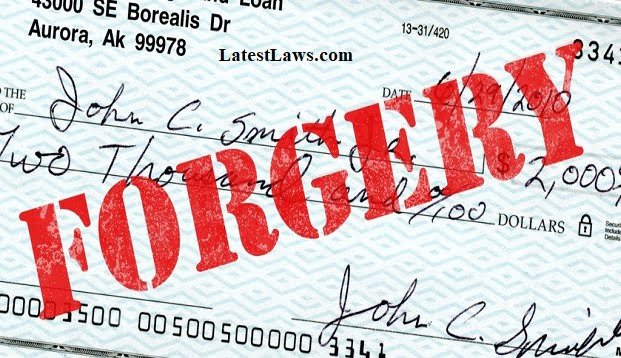Forgery is defined as creating, using, changing, or possessing a fraudulent document to commit fraud. The offense may involve counterfeiting a check, an official document, a signature, or any other type of government document. Such compositions typically rely heavily on the ability to deliver and trade authentic and trustworthy records. In this sense, falsified documents may seriously and adversely affect businesses, people, and the government. Therefore, the act of forgery is considered as a felony in UAE and most other countries.
According to UAE law, forgery is “an act that modifies the truth of a written instrument in a way that causes prejudice and replaces the false change with the genuine document.” Forgery is punishable by up to 10 years in prison and penalties.
The Seven Conditions of Forgery
There are seven ways to commit the crime of forgery, according to Article 216 of the UAE penal code, and they are as follows:
1. “To alter a genuine instrument, whether by adding, or removing or changing any of its written parts, numbers, marks or pictures.
2. To falsely sign or place a forged seal, or to alter a genuine signature, seal or imprint.
3. To obtain by surprise or by fraud the signature, seal or imprint of a person who ignores the contents of the instrument or who has not validly given his consent thereon.
4. To make falsely or imitate an instrument and attribute it to another person.
5. To fill a blank paper which is signed, sealed or imprinted, without the approval of the person who has signed, sealed or imprinted it.
6. To assume the name of another person or to substitute it in a document which has been prepared specifically to prove the identity of such other person.
7. A material alteration of writing with a deceitful and fraudulent intent, preventing therefore the genuine intent of the instrument from being achieved.”
According to the law, as mentioned above, forgery is divided into material forgery and moral forgery. The former copy is committed when the accused considerably alters the document or makes a material alteration to the record. At the same time, moral forgery occurs when the criminal modifies the document’s essential details, such as the date, content, conditions, etc.
Fundamentally examining the grounds of reference in cases of forgery, the Court of Cassation has determined that, per UAE Evidence Law, the burden of proving the act of forgery rests on the complainant to establish the reliability of the document on which they were relying. If the accused flatly rejects the accusations of forgery, the complainant must show the contrary.
However, the examination for a forgery can begin at any point during the proceedings. The claimant must provide documentation and evidence to establish the act of forgery perpetrated on the allegedly falsified document. However, the court may send the document for additional investigation to decide if the information offered by the complainant is insufficient or if the court believes they can further research the subject or the document.
Forgery of Electronic Documents
Forgery of electronic documents in the UAE is a punishable offense, and offenders will face stiff penalties, starting from a minimum of Dhs100,000 monetary fine to jail time. According to Article 6 of Federal-Decree Law number 5 of 2012 on combating cybercrimes, violators will face temporary imprisonment and a fine of not less than Dhs150,000 and not more than Dhs750,000 for forging an electronic document of federal or local government authorities or local or federal public establishments.
Furthermore, if forged documents belong to an authority other than those stipulated above, the punishment will include imprisonment and a fine of not less than Dhs100,000 and not greater than Dhs300,000 or either of the two penalties. The same penalty shall be levied on those who use a forged electronic document bearing knowledge of its falsification.
Fake Claims in the UAE Court
False reports made to judicial or administrative authorities in the UAE are a penal offense according to federal law No. 3 of 1987 and its revisions (the UAE Civil Code). Along with penalties, incarceration is a possible punishment. The element of “bad faith” is one of the critical considerations UAE courts make while investigating crimes involving false accusations. In addition, the same punishment must be meted out to the fabricator if a false allegation results in the conviction of another person.
According to Article 276: Anyone who, in bad faith, provides false information to judicial or administrative authorities regarding the commission by a person of an act or omission that results in a criminal punishment or executive disciplinary action, even if no criminal or disciplinary action is taken, as well as anyone who, contrary to the truth, fabricates material evidence on the commission of a crime by a person, shall be subject to detention, a fine, or one of these two penalties If the created crime is a felony, both cases will result in imprisonment or a fine; if the faked crime results in a criminal verdict, the fabricator will also get the same punishment.
Marwa Al Reyami Lawyers and Legal Consultants has assisted several defendants struggling in the cases of forgery and in the event you find yourself in the similar situation, it is advised to approach us.

